Who is a member?
Our members are the local governments of Massachusetts and their elected and appointed leadership.

An online resource, known as BioMap, identifies critical lands and waters throughout Massachusetts most in need of conservation.
The Massachusetts Division of Fisheries and Wildlife and The Nature Conservancy have enhanced an online resource, known as BioMap, that identifies critical lands and waters throughout Massachusetts most in need of conservation.
For more than 20 years, BioMap has been an important tool for proactive and high-impact conservation by state agencies, land trusts, municipalities, non-government organizations, academics, and other partners.
BioMap identifies the most critical habitats for rare species and the diversity and abundance of plants and wildlife. These resilient and intact ecosystems and landscapes are essential for both nature and people in the face of climate change.
BioMap’s comprehensive synthesis of biodiversity identifies places that will stand the test of time and support ecosystem benefits such as clean air and drinking water, recreation opportunities, economic benefits, and public health and well-being.
The new BioMap adds local habitat data to complement statewide biodiversity information. The local habitats are specifically designed to support municipal decisions and funding, and they make BioMap relevant to many new communities. BioMap facilitates coordination and collaboration to achieve landscape-level conservation by galvanizing effective partnerships, resulting in greater collective success.
Several grant programs offered by the Division of Conservation Services list BioMap in their criteria, including the Local Acquisitions for Natural Diversity (LAND) grant, and the Landscape Partnership Grant. These programs help communities obtain funding for land and water protection and build partnerships through shared conservation goals.
The BioMap hub includes web pages that explain the components of biodiversity, their importance, and how to access and apply the information.
BioMap now includes a Habitat Restoration Resource Center that provides recommendations and resources for stewardship actions to promote habitat resilience, restore ecological processes, and allow communities to adapt to climate change.
For more, visit mass.gov/BioMap. For questions or to request technical assistance, email natural.heritage@mass.gov.